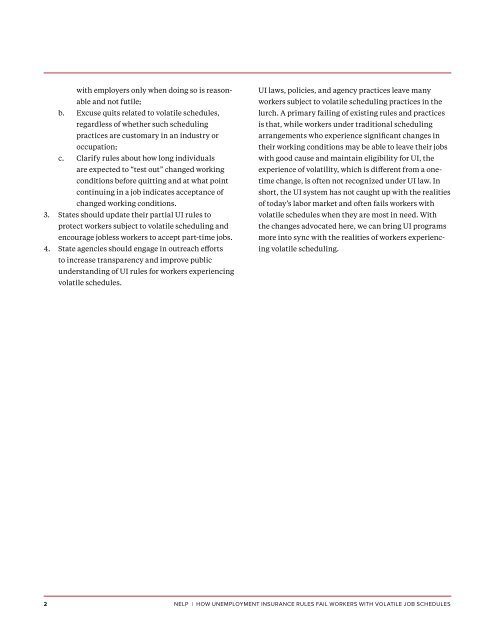with employers only when doing so is reasonableand not futile;b. Excuse quits related to volatile schedules,regardless <strong>of</strong> whether such schedulingpractices are customary in an industry oroccupation;c. Clarify rules about how long individualsare expected to “test out” changed workingconditions before quitting and at what pointcontinuing in a job indicates acceptance <strong>of</strong>changed working conditions.3. States should update their partial UI rules toprotect workers subject to volatile scheduling andencourage jobless workers to accept part-time jobs.4. State agencies should engage in outreach effortsto increase transparency and improve publicunderstanding <strong>of</strong> UI rules for workers experiencingvolatile schedules.UI laws, policies, and agency practices leave manyworkers subject to volatile scheduling practices in thelurch. A primary failing <strong>of</strong> existing rules and practicesis that, while workers under traditional schedulingarrangements who experience significant changes intheir working conditions may be able to leave their jobswith good cause and maintain eligibility for UI, theexperience <strong>of</strong> volatility, which is different from a onetimechange, is <strong>of</strong>ten not recognized under UI law. Inshort, the UI system has not caught up with the realities<strong>of</strong> today’s labor market and <strong>of</strong>ten fails workers withvolatile schedules when they are most in need. Withthe changes advocated here, we can bring UI programsmore into sync with the realities <strong>of</strong> workers experiencingvolatile scheduling.2 NELP | HOW UNEMPLOYMENT INSURANCE RULES FAIL WORKERS WITH VOLATILE JOB SCHEDULES
1 IntroductionMillions <strong>of</strong> Americans work in jobs that are notonly low-paying, but also pr<strong>of</strong>oundly unstable;these workers experience schedules that fluctuatewildly from week-to-week, both in terms <strong>of</strong> total hoursand shift times, <strong>of</strong>fer little advance notice <strong>of</strong> schedules,and frequently require on-call work. At the same time,involuntary part-time work, which reached record highsduring the recession, remains extremely high – workerssimply aren’t getting enough hours to make endsmeet despite their willingness to work. In the currenteconomy, employers’ volatile scheduling practices areas much a problem as low wages in some occupations.Though higher wages are critical, if those wages are onlyavailable for one or two shifts a week, or in jobs thatwreak havoc on workers’ lives, we have not solved ournation’s job quality problems. We refer to schedules withone or more <strong>of</strong> these characteristics as volatile schedulesin this paper.The effects <strong>of</strong> volatile schedules on workers’ lives arefar reaching. With little stability or predictability intheir schedules, workers struggle to arrange child careand access child-care subsidies, to attend classes or jobtraining, to hold down <strong>of</strong>ten desperately needed secondor third jobs, or simply to budget. One consequence <strong>of</strong>job schedule volatility is job loss – for some workers, themismatch between job schedules and the rest <strong>of</strong> theirresponsibilities becomes untenable, either forcing themto quit or leading them to be fired from their jobs. Inthese cases, workers and their families need a safetynet to help them manage while they seek new, hopefullymore stable, employment. Too many low-incomefamilies fall into the gap between inadequately fundedneed-based cash public assistance programs, andrestrictive rules that limit their access to UI.This paper reveals the limited extent to which UI isresponsive to the needs <strong>of</strong> workers who are jobless dueto volatile work schedules. In addition, it finds thatpartial UI benefits are <strong>of</strong>ten unavailable to workerswhose hours are reduced either temporarily or permanently– a common experience for workers in jobs withvolatile schedules. The paper draws on a combination<strong>of</strong> legal research, qualitative interviews with UI <strong>of</strong>ficialsand advocates, and other available data and analysis to<strong>of</strong>fer researchers, policymakers, and advocates a broadoverview <strong>of</strong> the intersections between increasinglyprevalent features <strong>of</strong> today’s low-wage job market andone crucial safety net program – UI. 1The paper provides some background on volatile jobscheduling; <strong>of</strong>fers an overview <strong>of</strong> UI rules that are relevantto the topic; examines how UI rules might applyspecifically to workers with volatile schedules; makes aseries <strong>of</strong> recommendations; and concludes by summarizingour findings.NELP | OUT OF SYNC 3


